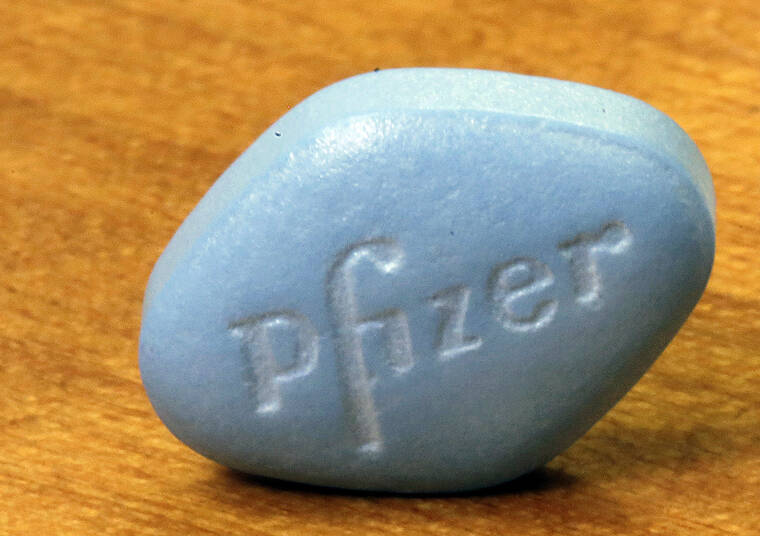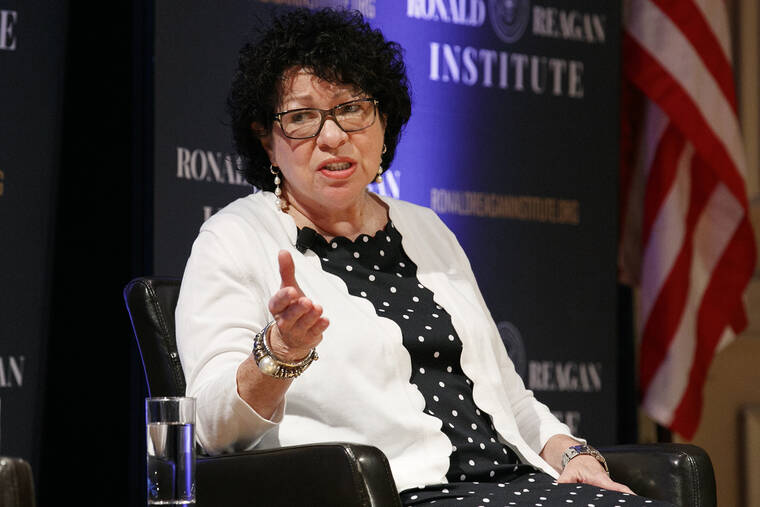NOT REAL NEWS: A look at what didn’t happen this week
A roundup of some of the most popular but completely untrue stories and visuals of the week. None of these are legit, even though they were shared widely on social media. The Associated Press checked them out. Here are the facts:
• • •
ADVERTISING
CLAIM: Viagra can cure COVID-19.
THE FACTS: Medical experts told The Associated Press that the use of Viagra to treat COVID-19 is “entirely unproven,” and cautioned against its use among COVID patients without further research. A spokesperson for Viatris, which markets Viagra, told the AP that the drug “is not indicated for COVID-19 or related symptoms.” Claims that the commonly-used erectile dysfunction drug Viagra could be useful in treating — or even “curing” — COVID-19 began circulating online after one woman in the U.K. relayed her experience being prescribed the drug while battling the virus. In a Jan. 2 interview with a British tabloid, the 37-year-old woman credited Viagra with opening up her airways after she was hospitalized and placed in a medically-induced coma with severe COVID-19. Her story was discussed during a Fox News segment, further amplifying the claims. Viagra functions by expanding blood vessels, helping increase blood flow. While this makes the drug effective in treating erectile dysfunction, the same properties also led the FDA to approve use of its active ingredient, sildenafil, for treatment of pulmonary hypertension, a type of high blood pressure that affects the lungs. With COVID-19, a hypothesis among some people is that because sildenafil helps relax blood vessels in the lungs, it may help improve oxygen levels among patients experiencing respiratory failure. But Dr. Daniel Culver, a pulmonologist and director of the Interstitial Lung Disease Program at Cleveland Clinic, said there has been no strong evidence the drug has been successful in these cases. “There has never been a survival benefit demonstrated from using any of these drugs for patients in the hospital with respiratory failure,” Culver said, adding: “Unless there are large studies demonstrating benefits that are important to patients, like survival or getting out of the hospital sooner, I think it’s dangerous to advocate use of sildenafil for COVID at this time.” Dr. Ashley Winter, a urologist specializing in sexual dysfunction at Kaiser Permanente in Portland, Oregon, also warns against jumping to conclusions about the drug’s effectiveness against COVID. “Just because it dilates blood vessels doesn’t mean that it has any antiviral capabilities,” Winter said. “If somebody is early on in a COVID infection and they don’t have pulmonary hypertension — if you don’t need to treat that specific symptom associated with being severely ill — the Viagra is not going to do anything to your COVID infection.” Some social media users cited a Jan. 3 study out of Chile, which evaluated the use of sildenafil for treating blood flow issues in the lungs of 40 COVID patients who were suffering respiratory complications. The researchers found “no statistically significant differences” in the oxygen status of patients who were given sildenafil and those who weren’t. The study did find that sildenafil could “have a potential therapeutic role” in preventing invasive ventilation under certain conditions for some COVID-19 patients, but the paper said the findings needed further research. Culver advised readers to “exercise caution” when reviewing the results. “I don’t think we can suggest that it was this particular therapy that made a difference,” Culver said. “It’s possible but it’s entirely unproven. And in fact, it’s quite risky to use the active agent in Viagra, sildenafil, in patients with respiratory failure.”
— Associated Press Writer Sophia Tulp in Atlanta contributed this report.
• • •
CLAIM: The Washington State Board of Health at a Jan. 12 public meeting was scheduled to consider a proposed rule change to allow the involuntary detainment of unvaccinated residents in COVID-19 quarantine camps.
THE FACTS: The board was scheduled to discuss changes to the Washington Administrative Code’s section on communicable and certain other diseases in accordance with a new law about how the state handles HIV, not COVID-19. The state’s quarantine and isolation procedures, which have been in place since 2003 and are similar to rules in several other states, aren’t undergoing any changes. Still, fear-inducing articles, videos and social media posts falsely claimed Washington state health officials were preparing to chase down unvaccinated people and force them into COVID-19 quarantine camps. The posts completely misrepresent the state Board of Health’s scheduled Wednesday discussion on changing the Washington Administrative Code to align with a new law about HIV, according to Keith Grellner, who chairs the board. Whenever lawmakers in Washington state pass new bills into law, state agencies codify those laws by creating rules and regulations in the Washington Administrative Code. The code has had a section on communicable and certain other diseases since at least 1988, Grellner said. In June 2020, state lawmakers passed a bill “ending statutory HIV/AIDS exceptionalism, reducing HIV-related stigma, defelonizing HIV exposure, and removing barriers to HIV testing,” according to the state Board of Health website. As a result, the board must adjust the code to ensure its rules comply with the new law. The section the board has proposed adjusting, WAC 246-100, governs the state’s handling of communicable and certain other infectious diseases. COVID-19, as a communicable disease, falls under that category, but the changes that are currently being proposed do not alter the state’s handling of the disease, Grellner said. WAC 246-100-040 is a subsection of the code that deals specifically with quarantine and isolation procedures. Social media users claimed the state Board of Health was proposing a change to that section, but both the board and the code reviser’s office confirmed to the AP that this section has no proposed changes and has not been altered since it was first introduced in 2003. Grellner said he believes the state has only used its quarantine and isolation procedures with regard to tuberculosis, and rarely at that. He added that the procedures don’t give health officials “unilateral” authority to take someone against their will — individuals affected would have the right to petition a superior court for release. Some social media users falsely claimed that the state Board of Health’s meeting Wednesday would also include a vote to require the COVID-19 vaccine for school-aged children. That’s not true, according to the state Board of Health. The board clarified on its website that it would receive a briefing from an advisory group on the topic at the meeting, but it wouldn’t take any action on the matter on Wednesday. Some of the online posts sharing false information about the board’s meeting also revived the months-old misleading claim that Washington Gov. Jay Inslee’s office is hiring a “strike team” to run camps where unvaccinated residents could be forced to quarantine. That claim stems from a real job posting, but not for positions forcing residents to quarantine. Instead, the job postings dealt with a facility where visitors to the state could safely quarantine if they did not have another safe place to go. A press secretary for Inslee confirmed in an email to the AP that the governor has never considered hunting down unvaccinated people to force them to quarantine.
— Ali Swenson
• • •
CLAIM: U.S. Supreme Court Justice Sonia Sotomayor dined with Democratic congressional leadership at a restaurant on Jan. 7.
THE FACTS: The claim is based on inaccurate reporting from Politico on Jan. 8, which was eventually corrected. The news outlet erroneously reported that Sotomayor attended the dinner, but later said it had mistakenly identified Iris Weinshall, Senate Majority Leader Chuck Schumer’s wife, as Sotomayor. The posts falsely claiming that Sotomayor dined with Democratic politicians on Jan. 7 continued to spread on social media last weekend, despite the source of the claim retracting it. Users pointed out that Sotomayor had attended court remotely earlier in the day, during oral arguments over the Biden administration’s COVID-19 vaccine rules for private employers and health care workers. “‘Justice Sotomayor, who participated in yesterday’s SCOTUS arguments remotely from her chambers, seen last night at Le Diplomate with Speaker Pelosi, Senate Majority Leader Schumer and Sens. Klobuchar and Durban, per Politico,’” said one Jan. 8 Facebook post. Politico made the false claim in its Playbook newsletter the morning of Jan. 8, linking to a photo that appears to show several of the politicians sitting at a table at a restaurant. But it posted a correction later that day, stating it had “erroneously placed Supreme Court Justice Sonia Sotomayor dining with Democratic leaders at a Washington restaurant Friday night.” The correction goes on to state that its source “mistook Iris Weinshall, wife of Senate Majority Leader Chuck Schumer, for the justice.” A spokesperson for Schumer confirmed to The Associated Press that Sotomayor was not in attendance at the dinner. Sotomayor, who is diabetic, chose to stay in her office at the court and participate remotely during the Jan. 7 arguments over the Biden administration’s COVID-19 vaccine rules. During these oral arguments, Sotomayor separately claimed that more than 100,000 children are in “serious condition” with COVID-19 in the U.S, remarks that also generated significant discussion on social media. But her statement was incorrect. Federal data shows that more than 5,000 minors are currently hospitalized with confirmed or suspected COVID-19. And between August 2020 and last Friday, when Sotomayor made the claim, fewer than 83,000 kids had been hospitalized with the virus, according to the U.S. Centers for Disease Control and Prevention. The U.S. Supreme Court’s public information office did not immediately respond to the AP’s requests for comment on either issue.
— Associated Press writers Josh Kelety in Phoenix and Karena Phan in Sacramento, California, contributed this report.
• • •
CLAIM: Video shows a New York Times editor, Carlos Tejada, talking about taking the booster shot the same day he died of a heart attack.
THE FACTS: The video shows Stewart Reynolds, a comedian from Canada, not Tejada. A humorous video of Reynolds announcing he’d just taken his booster shot and encouraging people to do the same, circulated on Twitter with false claims stating it shows Tejada, the deputy Asia editor of The New York Times, who died of a heart attack in late December. “NYT EDITOR MAKES VIDEO ABOUT TAKING HIS 3RD BOOSTER &DIES THE SAME DAY OF A HEART ATTACK,” read the erroneous caption on the video of Reynolds. Reynolds posted the video on Twitter on Dec. 17 with the caption: “HOW MANY SHOTS WILL WE NEED TO GET?” He addressed the false claims on Twitter on Monday: “It was brought to my attention today that one of my videos has been edited into an anti-vaccination clip suggesting that I died after my booster shot and that I’m a NYT editor…To clarify, and as is plainly evident: I am not a NYT editor.” Tejada died on Dec. 17 at a hospital in Seoul. His wife Nora Tejada said that he died of a heart attack. Danielle Rhoades Ha, a spokesperson for The New York Times, wrote in an email to the AP that Tejada received a COVID-19 booster shot in Seoul on Dec. 17. The hospital in Seoul that Tejada was admitted to declined to comment on his death, citing local medical law.
— The Associated Press



